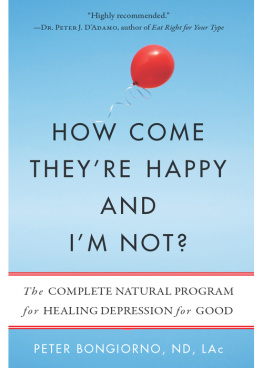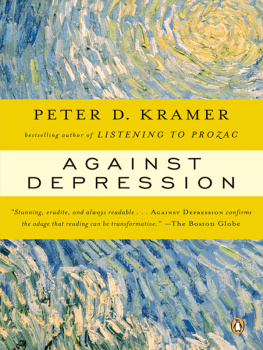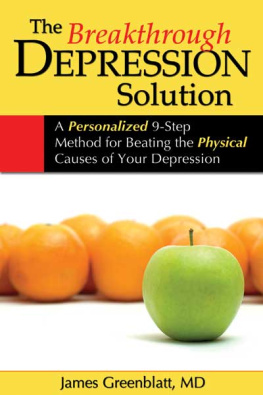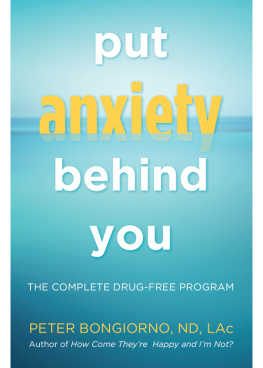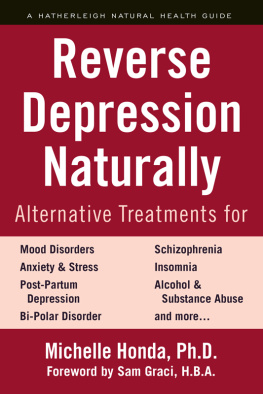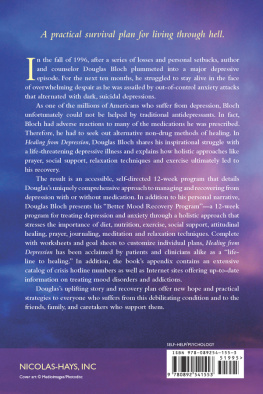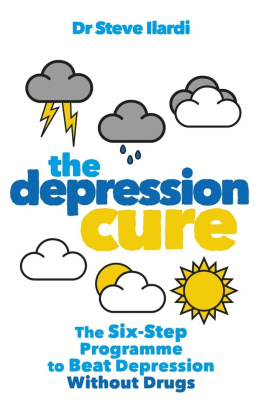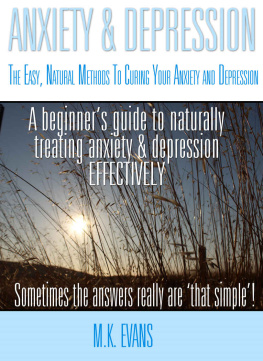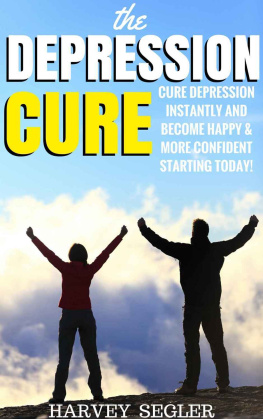
First published in 2012 by Conari Press
Red Wheel/Weiser, LLC
With offices at:
665 Third Street, Suite 400
San Francisco, CA 94107
www.redwheelweiser.com
Copyright 2012 by Peter Bongiorno, ND, LAc
All rights reserved. No part of this publication may be reproduced or transmitted in any form or by any means, electronic or mechanical, including photocopying, recording, or by any information storage and retrieval system, without permission in writing from Red Wheel/Weiser, LLC Reviewers may quote brief passages.
ISBN: 978-1-57324-580-7
Library of Congress Cataloging-in-Publication Data available upon request
Cover design by Jim Warner
Cover photograph Radius/SuperStock
Interior by Maureen Forys, Happenstance Type-O-Rama
Figures 1, 3, and 4 first printed in Peter Bongiorno's Healing Depression: Integrated Naturopathic and Conventional Treatments. CCNM Publishing, 2010. Reprinted with permission.
Printed in the United States of America
MAL
10 9 8 7 6 5 4 3 2 1
www.redwheelweiser.com
www.redwheelweiser.com/newsletter
This book is dedicated to my patients who have been, by far, my greatest teachers, inspirations, and help in writing this work. It's an honor to work with courageous women and men every day who share their stories, fears, intelligence, and passion for life with me in hope. I thank you and all who are challenged by mood. I offer my most profound respect and admiration.
I co-dedicate this book to every researcher whose tireless lab work and clinical hours contributed to the information that made this book possible.
The best six doctors anywhere
And no one can deny it
Are sunshine, water, rest, and air
Exercise and diet.
These six will gladly you attend
If only you are willing
Your mind they'll ease
Your will they'll mend
And charge you not a shilling.
NURSERY RHYME, SCHOOL LIFE, VOL IV, 1920
CONTENTS
ACKNOWLEDGMENTS
To my best friend, wife, and fellow naturopathic doctor, Pina, who did everything else there was to do so I could write.
I thank my parents, Peter and Patricia, for giving me every opportunity in life to follow my passions. To the Bongiornos, LoGiudices, Coppolas, and Zaccarias for their constant love.
Tremendous gratitude to Patricia Karpas and Mary Jane Ryan, who allowed this project to take substance and connect. To Caroline Pincus and everyone at Red Wheel/Weiser and Conari, who made my maiden voyage into the non-academic publishing world a kind and gentle learning experience.
... and to Sophia, my little rock star.
This book is strictly informational and is not intended as a substitute for medical advice. If you have a specific health concern or are experiencing any symptoms that scare or concern you, please contact a health care professional in your area and seek immediate medical help.
INTRODUCTION
A Short History of Depression
The goal of life is to make your heartbeat match the beat of the universe, to match your nature with Nature.
JOSEPH CAMPBELL
On any given day, 18 million Americans are depressed. That's almost 10 percent of the population. And that doesn't even count the 3.3 million of you who are suffering from dysthymia (chronic low mood). Despite America's amazing health care system, by 2020 depression will be the second leading cause of burden and disability not only in America but also worldwide, second only to heart disease. It's also the leading cause of disease for women among high-, middle-, and low-income countries.
THE BEST HEALTH CARE IN THE WORLD?
I was speaking a bit tongue in cheek when I said amazing health care system. I cannot tell you how many medical lectures I have been to in my almost twenty years of research, schooling, and clinical practice in which some doctor or administrator has claimed that our system in America is the number one system in the world. I need to let you, and those speakers, in on a little fact: The World Health Organization looked closely at the efficacy of health care systems around the world and ranked the American system with other countries. Can you guess where we were ranked? Number one or two? In the top five? Nope, nope, and nope. Actually, we came up as number thirty-seven out of 191 countries, right between Costa Rica and Slovenia. And, to get that revered position, we outspend any other country per person by more than 250 percentso we spend the most money to keep our thirty-seventh place. Further, it seems life expectancy is actually going down. In 2005, the New England Journal of Medicine announced that for the first time the new generation would not likely live as long as the previous one. Yikes. Why are we spending all this money in order to be living shorter lives?
In the spirit of balance, let me also make it clear that, as a naturopathic physician (please see more about naturopathic medicine in the resources section of this book), I am not anti-medical doctor and I am not antidrug. When modern medicine is used appropriately, it can save a lifeno doubt. A quick story about me: When I was five years old, I had a benign tumor on one of my upper neck vertebrae that practically eroded the bone to the point that I was near being paralyzed. If it wasn't for modern medicine (anesthesia, antibiotics, and skillful surgery), I would likely be paralyzed today. I do not know of a natural therapy that would have helped at that point. As I tell my patients in my practice in New York City: If you get hit by a bus, don't come to my office for herbal therapy, a lifestyle change, and some caring words. Instead, get to the hospital and use all the brilliance modern medical care has to offer. But, for many long-term and chronic illnesses, modern medicine seems to be failing most of us by not addressing the underlying cause, instead using medicines that cover symptoms and do not help the body heal itself.
WHY THIS BOOK?
So why do you need this book? Can't you just take an antidepressant and then feel fine? In the standard medical model, you might think so, as physicians prescribe antidepressants more than any other drugs in the world. In the United States alone, a country with 281 million people, 232.7 million prescriptions were used in 2007, reported IMS Health, mostly to allay symptoms and to provide what was hoped to be a quick fix.
Unfortunately, when it comes to depression, rarely is there a quick fix. The human brain and its moods are very complicated. Some researchers now believe that to say the word depression is like saying the word cancer in the sense that it may be a group of disorders rather than a single entity. That's why some antidepressants work for some folks (about 30 percent of them) and not for others (about 70 percent of them). Some work well for a while and then stop working. Take the supposed miracle drug Prozac, for instance. Google Prozac poop out and you'll find over twenty thousand articles on the problem.
As most people suffering with depression have unfortunately found out, simply popping a pill is not usually a miracle treatment. In fact, despite their incredible popularity and all the marketing hype, antidepressants don't work well for far too many people, and their unpleasant side effects can be stronger than their supposed benefits.
Come with me on a short history of depression for a deeper look at this sorry state of affairs.
YOU WERE LIED TO
Depression was first recognized and treated by Hippocrates, the father of medicine, in the 5th century BC. This disease could render its victims helpless and hopeless, and at its worst, it could even cause death. Hippocrates, in all his brilliance, treated this serious and potentially fatal condition quite successfully with sleep, diet, herbs, and water baths.
Next page
